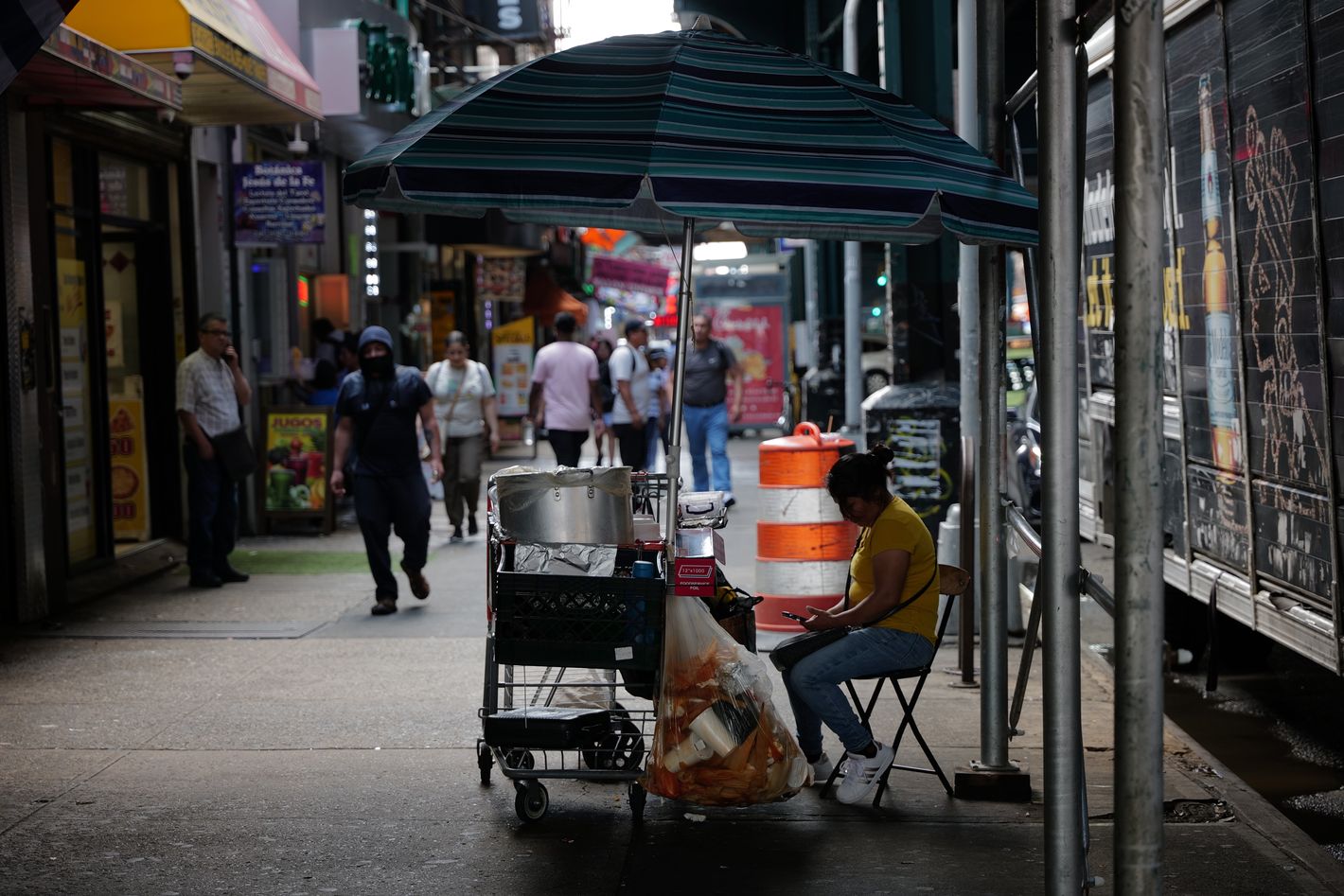when you want, where you want.
‘He’s Taking Advantage of Your Dream’
 Photo: Spencer Platt/Getty Images
Photo: Spencer Platt/Getty Images
This article was featured in One Great Story, New York’s reading recommendation newsletter. Sign up here to get it nightly.
Mercedes began selling arroz con pollo around Corona Avenue and Junction Boulevard in Queens in 2023, a couple of years after she moved here from Ecuador. Her options for work were limited because of her English and her immigration status, and she didn’t know much about the city’s laws for street vending. “Honestly, I didn’t talk to a lot of people about the industry — I really kept to myself,” says Mercedes, who asked to use a pseudonym. She didn’t have the required permit for her cart or a license for herself. “I would avoid getting any kind of tickets, drawing any kind of attention to myself, and I would abandon everything if I saw any enforcement,” she says. This past April, she was walking with two of her cousins around 60th Street in Queens when they were approached by two men. One was a heavyset guy named Mohamed Orabi, who, through a Spanish-speaking companion, offered to lease Mercedes an elusive, in-demand street-vending permit. She remembers Orabi’s pitch: “We know you sell food. Vendors aren’t being allowed to sell right now. With the permit I’m offering, you can work without problems.”
Orabi said it would cost $20,000 to lease the permit for two years. He asked for an $8,000 deposit and for the rest to be paid just days later. Mercedes felt she couldn’t spare the money, but she says he kept pressuring her: “A lot of people want this permit, there’s another lady who is ready, we can secure it if you pay now.” That night, Mercedes says she was able to get $5,000 as a loan from her brother. But Orabi said he would need more money: another $3,500 for insurance, which she forked over. They both signed a document, supposedly an NDA, at a notary’s office in Queens, where Mercedes handed over another $8,000. Orabi told her the last step would be a Department of Health inspection of the cart at a site in the Bronx, where Mercedes says she waited for several hours before getting a text from Orabi to tell her the inspection had failed and he now needed insurance documents. He asked for another $4,000 to process the paperwork. After Mercedes refused, Orabi texted back in Spanish, “When you have the money and want to continue, call me. Besides that, I won’t fall for your tricks of playing the victim.”
In total, Mercedes says she gave Orabi $16,500. In addition to her brother’s money, she used a loan she’d initially taken out to buy land back home. Mercedes remembers showing her friend the paperwork Orabi had set up for their agreement and what he said after questioning its legitimacy: “He’s taking advantage of your dream.” The friend took her to the cops, the court, and the Street Vendor Project, a nonprofit advocacy outfit, to share her story. There, Mercedes learned she wasn’t alone. Another Ecuadoran vendor said she’d given Orabi $29,500. One Afghan vendor had given Orabi $9,000 to acquire a new permit for the cart he uses to sell shami bun kebab and masala fries. The Street Vendor Project says 16 people have alleged that Orabi took money from them in exchange for help with obtaining permits, carts, and more supplies that never materialized. Even the associate of Orabi who had first approached Mercedes, she would come to find out, had been impacted: His wife was one of three plaintiffs who filed a joint lawsuit against Orabi in Queens Supreme Court, seeking more than $90,000 in repayment. (The other plaintiffs had planned to serve both American breakfast staples and dishes like pad Thai with shrimp and chicken-teriyaki rice bowls; they were going to call their truck Golden Dragon.)
Orabi refused to answer my questions about the allegations against him without an attorney present, then when pressed again for responses would no longer meet or talk to me at all, other than to say “None of it is true.” It may seem reckless that so many people would willingly hand over so much money to someone they barely know, but vendors can be consumed by desperation. “One of the biggest fears that people have is receiving criminal summonses for vending and having that impact their immigration status, especially in the current political climate” says Carina Kaufman-Gutierrez, vice-president of the Street Vendor Project. “That was something we heard directly from Mercedes: ‘I am afraid to vend because of that.’ People are feeling the pressure more and more that there is no other way forward besides renting a permit on the underground market.”
City law requires that street vendors possess licenses to sell food as well as permits for their carts and trucks, the number of which is currently capped at around 6,880 over all five boroughs. That policy, dating back to the 1980s, led to a thriving secondary market by which permit owners lease them out at extraordinary markups. The city charges $200 for 24-month terms; owners have been known to lease them over the same time period for upwards of $25,000. The wait list for a permit currently stretches roughly 7,500 names long, which means an estimated 75 percent of the city’s more than 20,000 street vendors fry eggs for breakfast sandwiches, slice al pastor from the trompo, and chip open little balls of fuchka without any permits at all, risking fines, tickets, and harassment from police.
Potential scams are everywhere: Posts of questionable legitimacy that advertise “citywide permits” for vendors are simple to find on Facebook Marketplace, for example. In 2021, the City Council passed a bill that changed the system in a somewhat convoluted fashion: “Supervisory licenses” now exist alongside existing permits. They’re functionally the same, with one key difference: Licensees must be present when vending. By 2032, all permits will have to be converted to supervisory licenses, with the overall cap set to be raised by 4,000. Former city councilmember Carlos Menchaca, a co-sponsor of the bill, said the legislation would be “incredibly transformative.” But fewer than 2,000 supervisory licenses have been made available. Meanwhile, enforcement under the Adams administration has become far more severe. In 2024, police issued 9,325 summonses for street vendors, a 500 percent increase from five years earlier. Of these, 2,040 were criminal summonses for minor vending violations such as being within ten feet of a subway station — almost ten times the number issued in 2019. NYPD officers have swept Roosevelt Avenue, a street-food hub; thrown carts into garbage trucks; and at least once attempted to handcuff a teenager for selling fruit. The rising threat of deportation under increased ICE enforcement has only made the situation more desperate for vendors.
Orabi’s family has a rich history with permits. According to city records, he has had one, as have his father, a brother who is a police officer, and an uncle, Issam Abdelkader. Orabi has in the past also identified himself as the permit holder for the Fort Greene Commissary next to the Brooklyn Navy Yard, one of the licensed garages where vendors are required to park their trucks and carts. Abdelkader’s son says that his dad was an owner at the Commissary for years and that Orabi started working there as a teenager. Possessing institutional knowledge and countless connections, Orabi has over the years served as a known middleman between permit owners and lessees. One vendor says the person building his food truck recommended Orabi to help him secure a permit. Another says a print-shop owner passed along Orabi’s name. A third first heard about Orabi in a WhatsApp group chat for vendors. The vendor who gave him $9,000 says a cousin recommended him for help with a permit; he knew him from storing his cart at the commissary for almost 20 years.
Leasing permits is technically against the law, so deals are typically handled in cash and vendors are often fearful to go the authorities. (One vendor says when they went to the police about a failed deal, they were told that leasing a permit was illegal.) Orabi apparently secures the trust of vendors with a photo of his license, signed paperwork, and notarized rental agreements. In some instances, he has pushed would-be vendors to pay for more: workers’ comp, insurance, a whole truck. In each of the instances reported, Orabi seems to disappear on the day he says a Health Department inspection is scheduled. “He knows that people are desperate to find a way to become a ‘legal’ business,” says Kaufman-Gutierrez. “That just also shows how desperate people are to move on the deal once they find someone with a permit because of this sense of scarcity.”
“The Health Department are the ones allowing this to happen,” says Alami Alamine Binani, another would-be vendor who was introduced to Orabi. Born in New York, Binani runs a midtown vegan restaurant. Earlier this year, he says he gave Orabi $4,000 up front and agreed to pay $1,000 a month for two years for a permit that never came to fruition. This spring, he filed a case against Orabi in civil court.
 Photo: Grub Street
Photo: Grub Street
It’s one of 11 similar suits filed against Orabi. In one complaint filed last year in Staten Island’s Supreme Court, Amer Suleiman, who owns a car dealership, alleged that Orabi took $595,000 from him to invest in companies and projects that did not actually exist, including $100,000 in April 2022 at least partially meant for Blank Street Coffee carts. In total, the suits allege Orabi owes $882,706 to would-be vendors, permit holders, and an investor.
The list goes on: Alan Ford is a 64-year-old New Yorker who says Orabi stole his ice-cream cart in hopes of leasing its permits to another vendor. Siddik Ates previously worked as a police officer in Turkey, and after he paid Orabi for both a permit and a cart that never materialized, he tried to file a police report, but, he says, “nobody calls, nobody comes.” Mercedes also tried to file a police report and was told, as other victims had been, to go to civil court.
“In my opinion, he might as well have a certificate of authority from the city to be doing what he’s doing,” says Kaufman-Gutierrez. “Everything he’s saying to these vendors is tied to an existing system.” There have been efforts to improve that system, but the changes are small: For years, the City Council has made various promises, including a proposal to repeal city officers’ ability to check vendors’ immigration status as part of the application in 2004. In 2016, legislation was again introduced to double the number of permits. In February of this year, the City Council introduced a package of five bills, one of which would increase the number of permits by 1,500 each year and lift the cap entirely after five years. Yet another, which the City Council passed in a 40-8 vote in June, removes misdemeanor criminal penalties for all vendors. However, for those operating without a permit or license — including those who dealt with Orabi — the bill only reduces a misdemeanor to a criminal violation and a fine or civil penalty. And the permit cap remains for now, meaning the unregulated secondary market does as well. Mercedes has yet to recoup any of the money she lost, and because she is now afraid to vend without a permit, she says she has struggled to find work to support herself and her family, including a teenage daughter. “I wanted to give her a better life,” Mercedes says, “but now she sometimes ends up helping me.”
Related
All Rights Reserved. Copyright , Central Coast Communications, Inc.